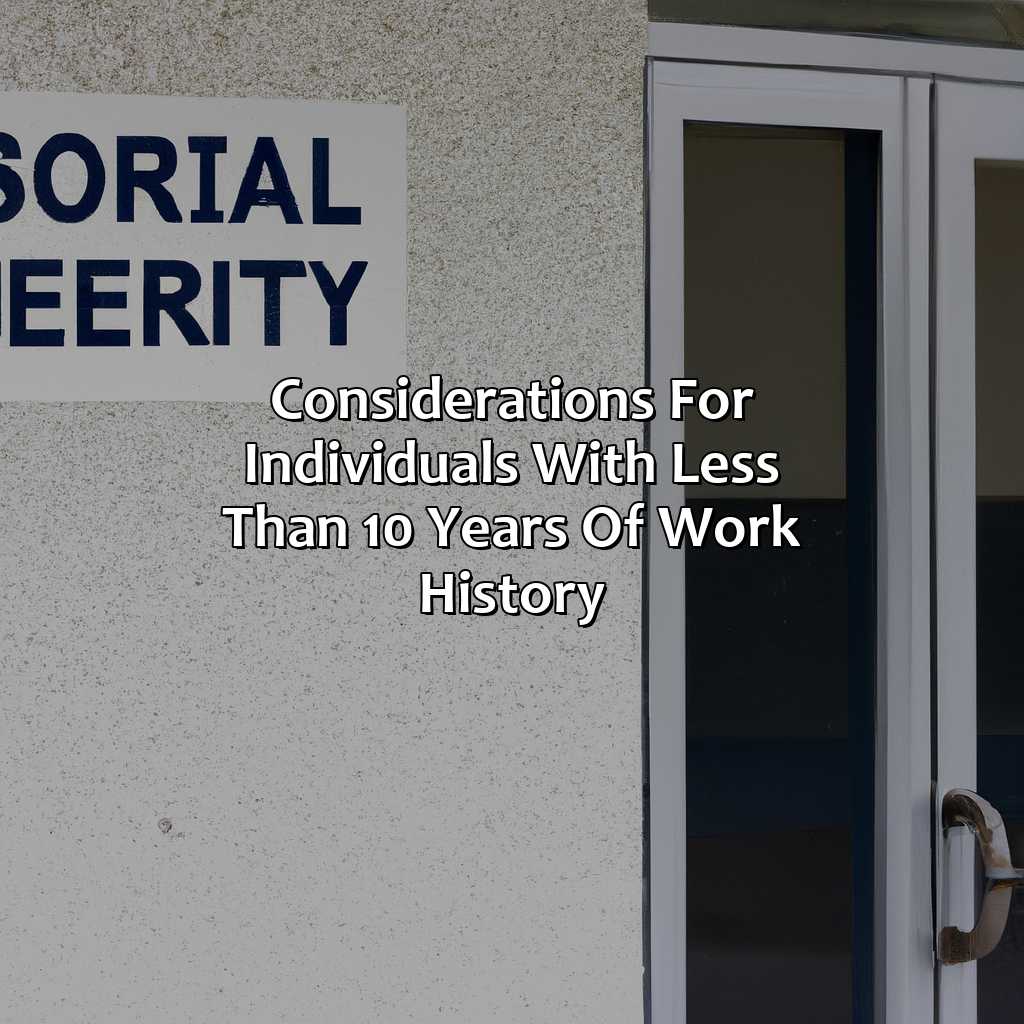How Much Social Security Will I Get If I Only Worked 10 Years?
Key Takeaway:
- The Social Security Administration calculates benefits based on an individual’s earnings history and average indexed monthly earnings (AIME). Individuals who worked for only 10 years will generally receive less benefits than those who worked longer.
- Factors that affect social security benefits for those with 10 years of work history include retirement age and full retirement age (FRA).
- Estimating Social Security benefits for those with 10 years of work history can be done through a Social Security statement, online calculator, or meeting with a Social Security representative. Individuals should also consider other sources of retirement income and take steps to increase their Social Security benefits.
Are you worried about how your Social Security benefits will be affected if you’ve only worked 10 years? Find out how much you can receive and gain peace of mind. You deserve to know how your hard work will pay off!
How the Social Security Administration calculates benefits
The process of determining Social Security benefits involves many factors, including the individual’s earnings history, the age at which they begin receiving benefits, and how many years they have worked. The Social Security Administration calculates benefits using a complex formula that takes into account these factors.
To better understand how benefits are calculated, here is a breakdown of the formula:
| Column 1 | Column 2 |
|---|---|
| Primary Insurance Amount | 90% of the first $996 |
| 32% of earnings between $996 and $6,002 | |
| 15% of earnings over $6,002 |
It is important to note that the formula used to calculate benefits is subject to change based on various factors. For example, the retirement age at which an individual begins receiving benefits can affect the amount of their monthly payment.
One unique detail to consider is that individuals who have only worked 10 years may be eligible for benefits if they have paid into the Social Security program during that time. However, the amount of their benefit may be lower than someone who has worked longer and earned higher wages over their lifetime.
According to the Social Security Administration, in 2021, the average retirement benefit for a retired worker is $1,543 per month. This fact illustrates the importance of planning for retirement and maximizing earnings over one’s career.

Image credits: retiregenz.com by David Jones
Factors affecting social security benefits for individuals who worked for only 10 years
To comprehend the elements that affect your social security benefits when you’ve only been employed for 10 years, check out the two subsections: Earnings history & AIME, and Retirement age & FRA.
Look into your income history and how your Average Indexed Monthly Earnings are worked out. This can provide insight into your benefit amount. Additionally, knowing how retirement age and full retirement age are calculated can assist you in making wise decisions when to claim your benefits.

Image credits: retiregenz.com by Adam Washington
Earnings history and average indexed monthly earnings (AIME)
Earnings record and the average monthly earnings over an indexed period determine Social Security benefits. The total number of years worked and wages earned throughout contribute to determining the AIME, which, in turn, calculates Social Security benefits.
Here is a table representation of how your Social Security benefit payment decides based on your AIME:
| Average Indexed Monthly Earnings (AIME) | Monthly payment in 2021 |
|---|---|
| $996 or less | Based on the exact figures |
| $997 – $1504 | $996 + 32% of income that exceeds $996 |
| $1505 and higher | $996 + 32% of income between a range from #997 to #1503 + 15% of above $1504 |
It’s essential to understand that factors like a change in one’s employment history, changing work patterns, taking a year off work or having periods of low earnings can influence one’s Social Security benefit calculation.
There was a case where a person was advised not to seek other employment after being laid off during Covid-19 because earning too much could ultimately reduce their Social Security retirement payments.
Retirement age can be a scary thought, but at least you’ll have more time to perfect your shuffleboard game.
Retirement age and full retirement age (FRA)
The age at which individuals can retire and receive social security benefits is a crucial factor in financial planning. Another important consideration is the full retirement age (FRA) which determines the monthly benefit amount based on how many years an individual has worked and their earnings history. The FRA varies based on birth year, ranging from 66 to 67 years old. However, taking early retirement as young as 62 or delaying until up to age 70 can also impact benefit amounts.
It’s worth noting that individuals who have worked for only ten years may still qualify for social security benefits but at a reduced rate. The Social Security Administration uses a formula that calculates benefits based on an average of top-earning years, so those who work fewer years will have less income reported during that period.
In historical contexts, the idea of social insurance programs like social security wasn’t even thought of until the early 20th century. Many people believed that personal savings were enough, but events such as the Great Depression proved this theory wrong and led to the creation of programs like Social Security Act.
10 years of hard work might not get you a gold watch, but it could earn you some social security benefits.
Estimating Social Security benefits for those with 10 years of work history
Two options exist for estimating your Social Security benefits over 10 years. You can:
- Access your statement and use the online calculator, or
- Meet with a Social Security rep.
We’ll show you how to access the statement and use the calculator. Plus, learn why meeting a rep is beneficial for your individual situation.

Image credits: retiregenz.com by David Jones
Social Security statement and online calculator
Social Security benefits can be easily estimated by accessing the Social Security Administration’s official website. The website provides a feature called the Benefits Calculator, which takes into account parameters like age, earnings, and years of work history to provide an estimate of monthly social security benefits. The online calculator is a convenient tool to get a quick overview of eligible benefits.
Apart from the online tools available, individuals can also refer to their Social Security statements that are issued annually by the administration. These statements have detailed information regarding the amount an individual would receive in case of retirement or disability. The statement’s primary purpose is to keep people informed about their future payments based on their earnings and work credits earned over time.
It’s important to note that both these methods provide only an estimate and not a final number as many factors can impact the final payment amount. It’s advisable to consult with a Social Security representative for a more accurate calculation based on your specific circumstances.
According to Forbes, “In 2021, the average monthly Social Security benefit was $1,543 for retired workers.”
Looks like I’ll finally have a reason to put on pants for my ‘Meeting with a Social Security representative’.
Meeting with a Social Security representative
A consultation with a Social Security expert can help determine one’s benefits. Through a face-to-face conversation, the representative will evaluate work history and provide projections for future payments. This can be particularly helpful for those who have worked only 10 years, as the calculation of benefits becomes more complicated with shorter employment histories.
Additionally, the representative may provide insight into claiming strategies that can maximize payments over time. For example, delaying Social Security payments until age 70 can result in a substantially higher monthly benefit. It’s important to note that each individual’s situation is unique and requires personalized advice from an expert rather than relying solely on online estimators or ballpark estimates.
Retirement income: because counting on that winning lottery ticket is not a viable strategy.
Other sources of retirement income
In today’s rapidly changing world, relying solely on Social Security for retirement income is not a wise choice. Hence, it is important to consider other sources of retirement income to live a comfortable life after retirement. Here are some other possible sources of retirement income that you may consider:
- Investment Income: Investment income such as stocks, bonds and mutual fund can provide additional retirement income. It allows you to earn money with less physical effort and time. However, investing involves risk and it’s important to work with an experienced financial advisor.
- Pension Income: Pension income is a great source of retirement income because it provides a guaranteed stream of income. However, the availability and details of pension varies with different employers and industries.
- Rental Income: Rental income can be a steady source of retirement income, especially if you have a property that is completely paid off. However, being a landlord has its own challenges such as the need for repairs and upkeep, finding tenants, and more.
It is important to note that each individual’s retirement plan and income sources may differ based on their age, income, lifestyle, and other personal factors. It is crucial to create a personalized plan that aligns with your retirement goals and risk tolerance level.
Planning and preparation are the keys to maximizing your retirement income. Start planning early, consider diversifying your income sources, and seek the help of an experienced financial advisor who can guide you through the process.
Don’t risk missing out on enjoying your golden years. Take the necessary steps today to secure a comfortable and stress-free retirement.

Image credits: retiregenz.com by David Jones
Considerations for individuals with less than 10 years of work history
Individuals with limited work history may wonder about their social security benefits.
For those with less than 10 years of work, Social Security Administration calculates benefits based on their earnings. Although the benefits may be lower, they can still be a helpful supplement to other retirement income sources. It is recommended to consult with an expert and plan accordingly.
Additionally, individuals with less work history can qualify for other benefits, such as disability payments, survivor benefits, and dependent benefits. These programs can cover medical expenses, provide income, and offer assistance to dependents.
Pro Tip: Even though social security benefits may be smaller with limited work history, explore other options, and plan carefully to make up the difference. It’s never too early to start planning for retirement.

Image credits: retiregenz.com by James Arnold
Steps to increase Social Security benefits for those with less work history
Social Security benefits can be increased for those who have not worked for a long time. To enhance the Social Security benefits of an individual with less work history, there are several steps that can be taken:
- Continue working for a few more years to increase the number of years in the work history section.
- Consider delaying the Social Security benefits till the age of 70, which increases the monthly payment.
- Increase the earned income after retirement as the amount earned may lead to higher Social Security benefits.
- Opt for lower-wage earning years to be excluded from lifetime earnings calculation to increase the average earnings of the years that are accounted for.
- Check for spousal benefits by being married to someone who is eligible for Social Security benefits.
- Search for low-income programs issued by the government, which can help in minimizing living costs and increasing future Social Security benefits.
It is important to note that the suggested steps may not always work and may not be applicable in all scenarios. However, implementing these steps can help improve the Social Security benefits.
Individuals should also be aware that Social Security benefits are directly linked with their work history, and that it is important to work for a longer period to increase Social Security benefits.
A True History is that the Social Security Act was passed by Congress on August 14, 1935, and signed into law by President Franklin D. Roosevelt on August 15, 1935, to provide retirement, disability, and survivors benefits to the American population.

Image credits: retiregenz.com by David Woodhock
Five Facts About How Much Social Security You Can Get If You Only Worked 10 Years:
Social Security benefits are calculated based on your 35 highest earning years. (Source: Social Security Administration)
If you only worked 10 years, your Social Security benefits will be lower compared to someone who worked longer. (Source: The Balance)
The minimum number of years you need to work to be eligible for Social Security benefits is 10 years. (Source: AARP)
The average Social Security retirement benefit was $1,543 per month in 2021. (Source: Social Security Administration)
You can estimate your Social Security benefits using the Social Security Administration’s online calculator. (Source: Social Security Administration)
FAQs about How Much Social Security Will I Get If I Only Worked 10 Years?
What is social security?
Social Security is a government program that provides retirement, disability, and survivors benefits to eligible individuals.
How much social security will I get if I only worked 10 years?
The amount of social security benefits you receive is based on your average earnings over the course of your career. If you only worked for 10 years, your benefits will be lower than if you had worked for 35 years or more.
Is it possible to get full social security benefits if I only worked 10 years?
It is unlikely that you will be able to receive full social security benefits if you only worked for 10 years. However, you may still be eligible for some benefits depending on your earnings history.
What is the minimum number of years I need to work to qualify for social security benefits?
You need to work for at least 10 years to qualify for social security retirement benefits. However, the amount of benefits you receive will be lower if you work for less than 35 years.
Can I receive social security benefits if I haven’t worked for 10 years?
You may be eligible for social security benefits even if you haven’t worked for 10 years. For example, if you are disabled or have reached retirement age, you may be able to receive benefits based on your spouse’s work history.
How can I estimate my social security benefits if I only worked 10 years?
You can use the Social Security Administration’s online retirement estimator to get an estimate of your benefits. This tool will take into account your earnings history and the number of years you worked to give you an estimate of your monthly benefits.
 Checkout this IRS Loophole
Checkout this IRS Loophole 
